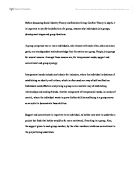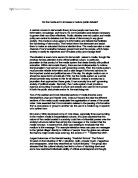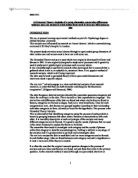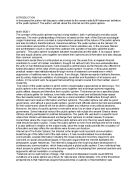A Discussion Into The Adequacy Of The Definition, “Power Is The Capacity To Make Another Individual Or Group Do Something They Would Not Otherwise Wish To Do”
A Discussion Into The Adequacy Of The Definition, "Power Is The Capacity To Make Another Individual Or Group Do Something They Would Not Otherwise Wish To Do"
Power, in sociological terms, is a subject that has many different definitions, resulting in a wide variety of views and concepts of what it is, how it is studied and how it can be manipulated. In this essay I hope to analyse this definition with reference to some of the many theories proposed by sociologists over the years.
It can be said without doubt that power is exercised by one party or another within all social relationships. However, this power can be manifested in many different forms within these relationships, and is often dependent on the form of social relationship that is in operation. For example, a social relationship could be in the form of two individuals interacting. E.g. Husband and wife. In this case the form and balance of power is not set, (although, according to traditional values, some would argue that the male has power over the female.) in modern day situations these are determined by many complex factors such as, social class, level of earnings, and the effects that having children have on a relationship. The power in this form of relationship is very different to that of an individual to an institution, for example a conductor's relationship to an orchestra. In this relationship the power is pre-determined and firmly with the conductor. It is non-interchangeable; the orchestra must follow the conductor's instructions in order to accomplish their goals. However, this is a very different form of power to that in a one-on-one relationship, as here there is no struggle for power, the orchestra have no desire to take the power from the conductor as they are all working toward a mutual goal. This analysis contradicts the initial definition of power stating that power is the capacity to enforce behaviour against their will. This theory is in keeping with Talcott Parsons' view of power, which states that power is a 'system resource', "a generalised facility or resource in society, which enables the achievement of collective goals through the agreement of members of a society to legitimise leadership positions whose incumbents further goals."1
Power, in sociological terms, is a subject that has many different definitions, resulting in a wide variety of views and concepts of what it is, how it is studied and how it can be manipulated. In this essay I hope to analyse this definition with reference to some of the many theories proposed by sociologists over the years.
It can be said without doubt that power is exercised by one party or another within all social relationships. However, this power can be manifested in many different forms within these relationships, and is often dependent on the form of social relationship that is in operation. For example, a social relationship could be in the form of two individuals interacting. E.g. Husband and wife. In this case the form and balance of power is not set, (although, according to traditional values, some would argue that the male has power over the female.) in modern day situations these are determined by many complex factors such as, social class, level of earnings, and the effects that having children have on a relationship. The power in this form of relationship is very different to that of an individual to an institution, for example a conductor's relationship to an orchestra. In this relationship the power is pre-determined and firmly with the conductor. It is non-interchangeable; the orchestra must follow the conductor's instructions in order to accomplish their goals. However, this is a very different form of power to that in a one-on-one relationship, as here there is no struggle for power, the orchestra have no desire to take the power from the conductor as they are all working toward a mutual goal. This analysis contradicts the initial definition of power stating that power is the capacity to enforce behaviour against their will. This theory is in keeping with Talcott Parsons' view of power, which states that power is a 'system resource', "a generalised facility or resource in society, which enables the achievement of collective goals through the agreement of members of a society to legitimise leadership positions whose incumbents further goals."1







